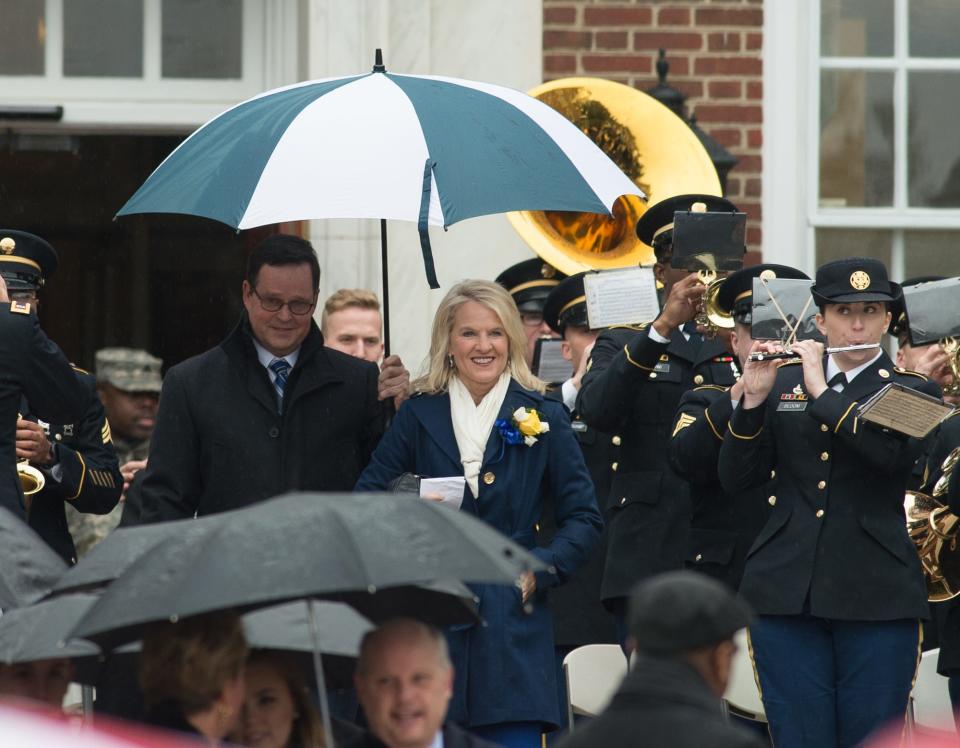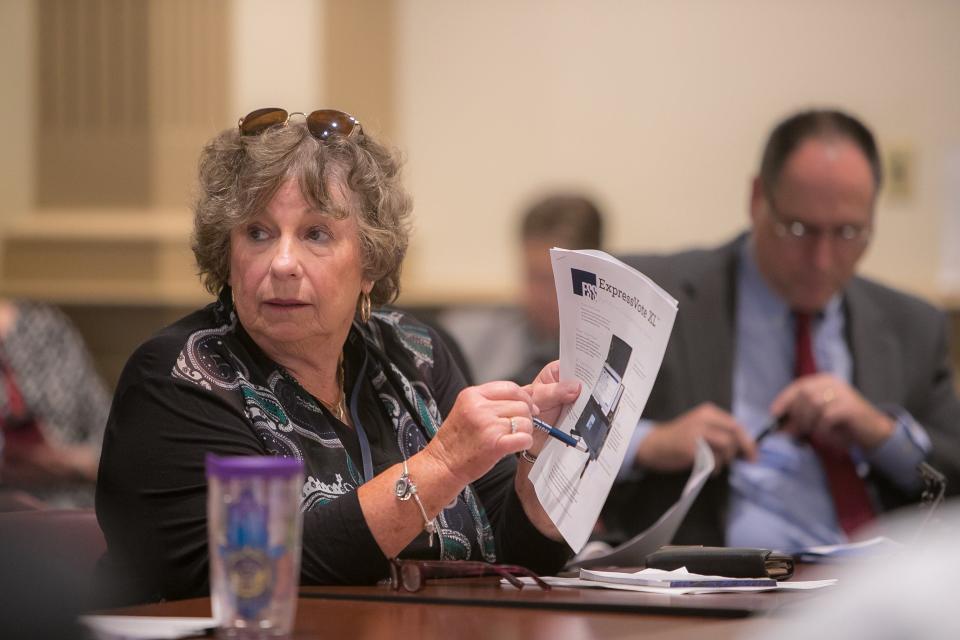Why Delaware elections commissioners rarely enforce campaign finance laws
Delaware elections officials have the authority to investigate campaign finance violations, but that oversight has never been used.
The state Department of Elections said that it has “no records” of probes conducted using the most basic power given to Delaware election commissioners: investigating “information coming to the attention of the commissioner that, if true, would constitute” a violation of campaign finance laws.
Even though Lt. Gov. Bethany Hall-Long publicly acknowledged campaign finance issues, the Elections Department has steered clear of using its investigatory powers to ensure that the gubernatorial candidate’s campaign hasn’t violated Delaware law.
Instead, Delaware voters and taxpayers are left to take Hall-Long’s campaign at their word when it announced the internal audit found “no wrongdoings or violations.”

The campaign has repeatedly declined to release the audit, instead claiming the amended campaign filings “fully convey” the results of the probe. Yet, those filings do not provide clarity on what the hundreds of thousands of dollars in loans paid for, causing some to question whether payments went directly to Hall-Long’s husband and campaign treasurer, Dana Long, according to reporting by WHYY.
CAMPAIGN ANNOUNCEMENT: Filings show Lt. Gov. Hall-Long improperly reported over $300K in campaign-related expenses
RELATED: How Hall-Long's refusal to release audit findings sparked elections reform talks
Department officials said they have neither received a copy of the audit nor are they conducting a third-party review of Hall-Long’s campaign finances, and refused to answer questions on what Delawareans must do to prompt the election commissioner to use their investigatory powers.
“The department does not comment on any potential or pending campaign finance-related reviews or investigations that may be conducted,” said department spokesperson Cathleen Hartsky-Carter in an email following repeated Delaware Online/The News Journal questions regarding this authority.
What authority do election officials have?
The duties and responsibilities of the Department of Elections and respective election commissioner are spelled out in the State Code, but elections officials have provided contradictory statements on those powers.
Per Title 15, Section 302 of Delaware Code, election commissioners have the authority to “investigate information coming to the attention of the commissioner that, if true, would constitute a violation of Chapter 80 of this title,” which is to say election officials can investigate campaigns for compliance with state laws regarding campaign expenditures and contributions.
Yet, elections officials say they have no records of probes conducted under this authority, and when a News Journal reporter asked about these powers, Hartsky-Carter initially said State Code “does not authorize the department to review or audit campaign finance reports.”
Pressed further, the department spokesperson responded that she was “not referring to the authority the department has under Title 15, Section 302, but stating that the department is not required by Delaware Code to review the content of submitted campaign finance reports.”
How one can investigate potential violations of campaign finance law without reviewing the reports is unclear, but even the department website notes the commissioner’s duties to investigate violations of the state’s campaign finance laws.
2024 DELAWARE RACES: Our updated list of Delaware candidates, announcements
The commissioner is appointed by the governor and confirmed by the Delaware Senate for a four-year term, and is an “ex officio member of the State Board of Elections” who attends all board meetings; provides supervision of the department; and develops regulations, policies and guidelines as outlined in Delaware Code.
The commissioner’s powers are further enumerated in Title 15 Ch. 80 Subchapter V on enforcement, which says the commissioner “shall at the request of any person, make a ruling that applies this chapter to a set of facts specified by the person.”
The last time those powers were used was in 2018 when the election commissioner at the time issued two advisory opinions, both of which found no violations of state campaign finance laws.
Using campaign finance enforcement authority
The election commissioner has issued seven advisory opinions in the last 15 years, which are prompted by questions voters, political committees and candidates may ask in regard to campaign finances and the election process.
The commissioner weighs in on a variety of questions and concerns, from a 2010 opinion on whether a candidate can use campaign funds to pay legal fees to a 2018 opinion on whether two elected officials violated state campaign finance laws.
In the latter opinion, then-election Commissioner Elaine Manlove absolved state Treasurer Ken Simpler and Senate Minority Leader Greg Lavelle of wrongdoing, but noted Lavelle serving as treasurer of a political action committee that spends money backing his campaign toed the line.

“While I believe his use of the mailings at issue steps right up to the legal line and the distinction in the statute, I reluctantly conclude his use of electioneering communications to support his own campaign does not step over the line is technically permitted,” Manlove wrote in the Oct. 26, 2018 opinion. “In my view, however, though legal, the practice is not consistent with the spirit of the law intended to promote transparency, fairness and clarity for voters and the election process.”
THE 2018 COMPLAINT: Election campaign finance complaint against Republican candidates Lavelle, Simpler rejected
State Justice Department officials say there have been only two instances when potential campaign finance issues were referred to the department’s Office of Civil Rights and Public Trust for criminal prosecution. But after state attorneys reviewed the cases, they determined there wasn’t enough evidence to move forward.
One of the few powers that Delaware election commissioners have exercised is issuing penalties for campaigns and candidates when they file late reports, but even those instances have lacked teeth.
A law recently passed by the General Assembly caps the $50 a day citation at 100 days and revised the commissioner’s duties so that the election official can pick and choose when to levy a fine for tardy reports. It also allows the election commissioner to negotiate a settlement of the outstanding fine, which applies retroactively, opening the door for people with huge outstanding fines to potentially waive them entirely.
How voters can prompt action
The public can contact the Elections Department with questions or concerns about filed campaign finance reports, Hartsky-Carter said.
“The department’s campaign finance team reviews the concern raised and provides a response and, if necessary, contacts the committee about which the inquiry was made (without revealing the identity of the individual inquiring) to share the concern or question raised,” she said.
If the “inquiry reveals that an amendment may be needed to a filed report,” Hartsky-Carter said the department works with the committee to ensure those amended reports are filed.
To contact the Elections Department with questions or concerns, email COE_Vote@delaware.gov or call 302-739-4277.
Got a tip? Contact Amanda Fries at afries@delawareonline.com, or by calling or texting 302-598-5507. Follow her on X at @mandy_fries.
This article originally appeared on Delaware News Journal: Delaware elections leaders can enforce finance laws, but rarely do

